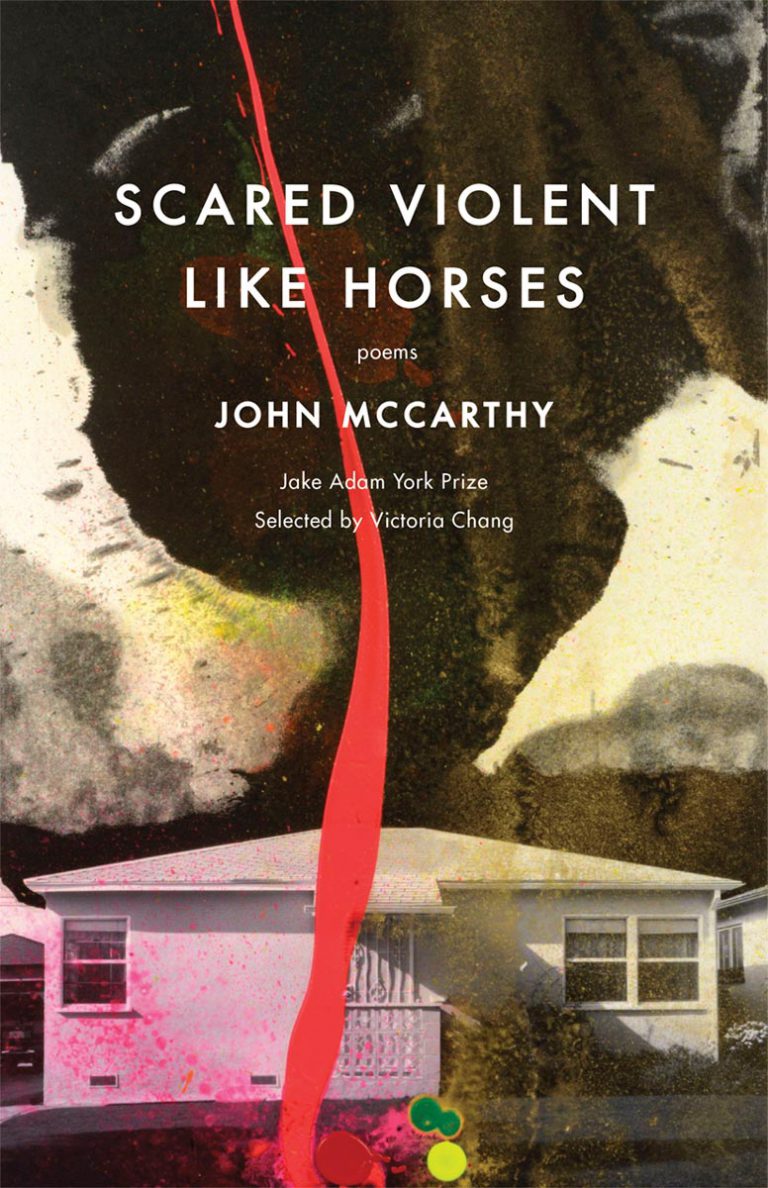Scared Violent Like Horses

Chosen by Victoria Chang as the winner of the 2017-18 Jake Adam York Prize.
John McCarthy’s Scared Violent Like Horses is a deeply personal examination of violent masculinity, driven by a yearning for more compassionate ways of being.
McCarthy’s flyover country is populated by a family strangled by silence: a father drunk and mute in the passenger seat, a mother sinking into bed like a dish at the bottom of a sink, and a boy whose friends play punch-for-punch for fun. He shows us a boy struggling to understand pain carried down through generations and how quickly abandonment becomes a silent kind of violence; “how we deny each other, daily, so many chances to care,” and how “we didn’t know how to talk about loss, / so we made each other lose.” Constant throughout is the brutality of the Midwestern landscape that, like the people who inhabit it, turns out to be beautiful in its vulnerability: sedgegrass littered with plastic bags floating like ghosts, dilapidated houses with abandoned Fisher Price toys in the yard, and silos of dirt and rust under a sky that struggles to remember the ground below.
With arresting lyricism and humility, Scared Violent Like Horses attends to the insecurities that hide at the heart of what’s been turned harsh, offering a smoldering but redemptive and tender view of the lost, looked over, and forgotten.
“John McCarthy’s impulse is narrative but this impulse is struck by the lightning of his linguistic powers . . . A stunning overlap of a lost boy and lost landscape through the lens of a gifted poet’s magical linguistic and storytelling abilities.” —Victoria Chang
“A book that grabs the reader with its insistent lyric beauty . . . where its speaker is haunted by the empty violence and despair of a Midwestern landscape full of ‘smolder and silence.’ It’s a landscape usually underestimated and derided―the ‘flyover country’ of condescending editorials and talk show chatter. But in the hands of this poet, these hardscrabble landscapes, these haunts of hurt and hurting families and friends who show love through their thrown punches―these scenes become so relentlessly beautiful that a reader cannot look away.” —Allison Joseph
“Throbbing with the ‘quiet ache’ of the flown-over, John McCarthy’s extraordinary perception and lingual deftness unveil the grit and humble grandeur of Springfield’s north end. Rural Illinois’s emotional brutality is rendered raw as we see into and through a young man reaching beyond the debris of a violent and damaged lineage, in search of a gentler, less destructive self.” —Matt Rasmussen
“In this devastating, gorgeous collection, John McCarthy opens up ‘[t]he hurt and mangled parts of us,’ the places in us where we are ‘hollering fervent and raw,’ to explore the pain of abandonment and the purity of that loneliness, so that we might understand how trauma breeds desolation.” —Sara Eliza Johnson
